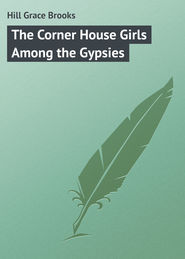По всем вопросам обращайтесь на: info@litportal.ru
(©) 2003-2024.
✖
The Corner House Girls
Настройки чтения
Размер шрифта
Высота строк
Поля
“I’ll ask Mr. Howbridge if we may look. I expect he has looked in all the likely places,” Ruth said, after a moment’s reflection.
“Then we’ll look in the unlikely ones,” chuckled Aggie. “You know, you read in story books about girls finding money in old stockings, and in cracked teapots, and behind pictures in the parlor, and inside the stuffing of old chairs, and – ”
“Goodness me!” exclaimed Ruth. “You are as imaginative as Dot herself.”
Meanwhile Tess and Dot had run out into the yard. They had already made a tour of discovery about the neglected garden and the front lawn, where the grass was crying-out for the mower.
Ruth said she was going to have some late vegetables, and there was a pretty good chicken house and wired run. If they could get a few hens, the eggs would help out on the meat-bill. That was the way Ruth Kenway still looked at things!
The picket fence about the front of the old Corner House property was higher than the heads of the two younger girls. As they went slowly along by the front fence, looking out upon Main Street, they saw many people look curiously in at them. It doubtless seemed strange in the eyes of Milton people to see children running about the yard of the old Corner House, which for a generation had been practically shut up.
There were other children, too, who looked in between the pickets, too shy to speak, but likewise curious. One boy, rather bigger than Tess, stuck a long pole between two of the pickets, and when Dot was not looking, he turned the pole suddenly and confined her between it and the fence.
Dot squealed – although it did not hurt much, only startled her. Tess flew to the rescue.
“Don’t you do that!” she cried. “She’s my sister! I’ll just give it to you – ”
But there came a much more vigorous rescuer from outside the fence. A long legged, hatless colored girl, maybe a year or two older than Tess, darted across Main Street from the other side.
“Let go o’ dat! Let go o’ dat, you Sam Pinkney! You’s jes’ de baddes’ boy in Milton! I done tell your mudder so on’y dis berry mawnin’ – Yes-sah!”
She fell upon the mischievous Sam and boxed both of his ears soundly, dragging the pole out from between the pickets as well, all in a flash. She was as quick as could be.
“Don’ you be ’fraid, you lil’ w’ite gals!” said this champion, putting her brown, grinning face to an aperture between the pickets, her white teeth and the whites of her eyes shining.
“Dat no-’count Sam Pinkney is sho’ a nuisance in dis town – ya-as’m! My mudder say so. ’F I see him a-tantalizin’ you-uns again, he’n’ me’ll have de gre’tes’ bustification we ever did hab – now, I tell yo’, honeys.”
She then burst into a wide-mouthed laugh that made Tess and Dot smile, too. The brown girl added:
“You-uns gwine to lib in dat ol’ Co’ner House?”
“Yes,” said Tess. “Our Uncle Peter lived here.”
“Sho’! I know erbout him. My gran’pappy lived yere, too,” said the colored girl. “Ma name’s Alfredia Blossom. Ma mammy’s Petunia Blossom, an’ she done washin’ for de w’ite folks yere abouts.”
“We’re much obliged to you for chasing that bad boy away,” said Tess, politely. “Won’t you come in?”
“I gotter run back home, or mammy’ll wax me good,” grinned Alfredia. “But I’s jes’ as much obleeged to yo’. On’y I wouldn’t go inter dat old Co’ner House for no money – no, Ma’am!”
“Why not?” asked Tess, as the colored girl prepared to depart.
“It’s spooky – dat’s what,” declared Alfredia, and the next moment she ran around the corner and disappeared up Willow Street toward one of the poorer quarters of the town.
“There!” gasped Dot, grabbing Tess by the hand. “What does that mean? She says this old Corner House is ‘spooky,’ too. What does ‘spooky’ mean, Tess?”
CHAPTER V – GETTING ACQUAINTED
By the third day after their arrival in Milton, the Kenway sisters were quite used to their new home; but not to their new condition.
“It’s just delightful,” announced Agnes. “I’m going to love this old house, Ruth. And to run right out of doors when one wants to – with an apron on and without ‘fixing up’ – nobody to see one – ”
The rear premises of the old Corner House were surrounded by a tight fence and a high, straggling hedge. The garden and backyard made a playground which delighted Tess and Dot. The latter seemed to have gotten over her first awe of the big house and had forgotten to ask further questions about the meaning of the mysterious word, “spooky.”
Tess and Dot established their dolls and their belongings in a little summer-house in the weed-grown garden, and played there contentedly for hours. Ruth and Aggie were working very hard. It was as much as Aunt Sarah would do if she made her own bed and brushed up her room.
“When I lived at home before,” she said, grimly, “there were plenty of servants in the house. That is, until Father Stower died and Peter became the master.”
Mr. Howbridge came on this day and brought a visitor which surprised Ruth.
“This is Mrs. McCall, Miss Kenway,” said the lawyer, who insisted upon treating Ruth as quite a grown-up young lady. “Mrs. McCall is a widowed lady for whom I have a great deal of respect,” continued the gentleman, smiling. “And I believe you girls will get along nicely with her.”
“I – I am glad to meet Mrs. McCall,” said Ruth, giving the widow one of her friendly smiles. Yet she was more than a little puzzled.
“Mrs. McCall,” said Mr. Howbridge, “will take many household cares off your shoulders, Miss Kenway. She is a perfectly good housekeeper, as I know,” and he laughed, “for she has kept house for me. If you girls undertook to take care of even a part of this huge house, you would have no time for anything else.”
“But – ” began Ruth, in amazement, not to say panic.
“You will find Mrs. McCall just the person whom you need here,” said Mr. Howbridge, firmly.
She was a strong looking, brisk woman, with a pleasant face, and Ruth did like her at once. But she was troubled.
“I don’t see, Mr. Howbridge, how we can afford anybody to help us – just now,” Ruth said. “You see, we have so very little money. And we already have borrowed from you, sir, more than we can easily repay.”
“Ha! you do not understand,” said the lawyer, quickly. “I see. You think that the money I advanced before you left Bloomingsburg was a loan?”
“Oh, sir!” gasped Ruth. “We could not accept it as a gift. It would not be right – ”
“I certainly do admire your independence, Ruth Kenway,” said the gentleman, smiling. “But do not fear. I am not lending you money without expecting to get full returns. It is an advance against your uncle’s personal estate.”
“But suppose his will is never found, sir?” cried Ruth.
“I know of no other heirs of the late Mr. Stower. The court recognizes you girls as the legatees in possession. There is not likely to be any question of your rights at all. But we hope the will may be found and thus a suit in Chancery be avoided.”
“But – but is it right for us to accept all this – and spend money, and all that – when there is still this uncertainty about the will?” demanded Ruth, desperately.
“I certainly would not advise you to do anything that was wrong either legally or morally,” said Mr. Howbridge, gravely. “Don’t you worry. I shall pay the bills. You can draw on me for cash within reason.”
“Oh, sir!”
“You all probably need new clothing, and some little luxuries to which you have not been always accustomed. I think I must arrange for each of you girls to have a small monthly allowance. It is good for young people to learn how to use money for themselves.”
“Oh, sir!” gasped Ruth, again.
“The possibility of some other person, or persons, putting in a claim to Mr. Peter Stower’s estate, must be put out of your mind, Miss Kenway,” pursued the kindly lawyer. “You have borne enough responsibility for a young girl, already. Forget it, as the boys say.
“Remember, you girls are very well off. You will be protected in your rights by the court. Let Mrs. McCall take hold and do the work, with such assistance as you girls may wish to give her.”
It was amazing, but very delightful. “Why, Ruth-ie!” cried Agnes, when they were alone, fairly dancing around her sister. “Do you suppose we are really going to be rich?”











